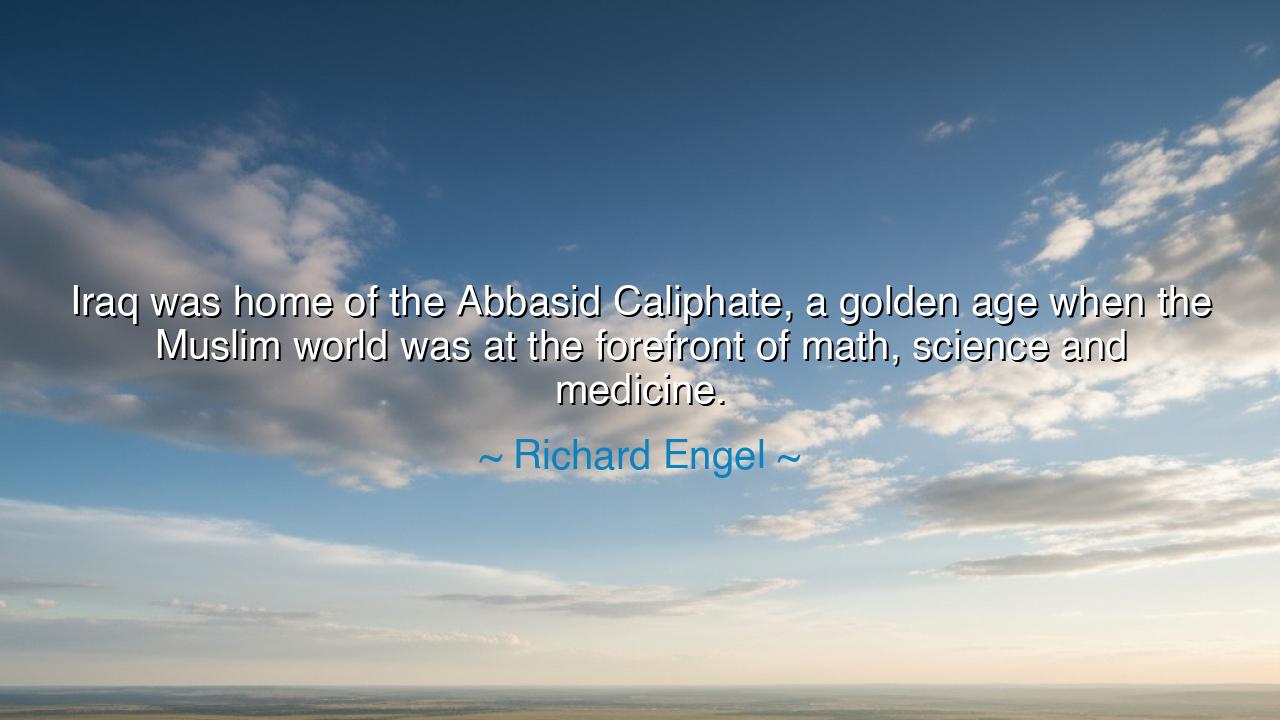
Iraq was home of the Abbasid Caliphate, a golden age when the
Iraq was home of the Abbasid Caliphate, a golden age when the Muslim world was at the forefront of math, science and medicine.






"Iraq was home of the Abbasid Caliphate, a golden age when the Muslim world was at the forefront of math, science, and medicine." These words spoken by Richard Engel highlight a pivotal moment in human history—a time when the Abbasid Caliphate in Iraq became the center of intellectual achievement, and the Muslim world stood at the apex of human knowledge. The golden age Engel refers to was a period that spanned from the 8th to the 13th century, during which Baghdad—the capital of the Abbasid Caliphate—became the heart of an intellectual renaissance that would forever alter the course of human progress. It was here that mathematics, astronomy, medicine, and philosophy flourished, thanks to a dedication to knowledge that transcended borders and cultures.
In the ancient world, the importance of learning and the pursuit of knowledge was well understood. The Greeks, for instance, established the foundations of rational thought, with figures like Plato and Aristotle shaping the intellectual tradition of the Western world. Yet, the Abbasid Caliphate and its scholars in Baghdad elevated these teachings, preserving and expanding upon the works of the Greeks and Romans, and introducing innovations that would lay the groundwork for the Renaissance and the scientific revolution. The House of Wisdom—an intellectual institution in Baghdad—became a sanctuary where scholars, mathematicians, and scientists from diverse cultures came together, exchanging ideas and pushing the boundaries of human knowledge. It was here that scholars like Al-Khwarizmi and Avicenna made monumental contributions to mathematics and medicine, forever changing the trajectory of human understanding.
One of the most significant contributions of the Abbasid era was in the field of mathematics, where the work of scholars like Al-Khwarizmi led to the development of algebra—a term derived from his book Al-Kitab al-Mukhtasar fi Hisab al-Jabr wal-Muqabala (The Compendious Book on Calculation by Completion and Balancing). Al-Khwarizmi’s algebra laid the foundation for modern mathematics, as it introduced the concept of solving equations using unknown variables. His work was translated into Latin and spread across Europe, where it would serve as a cornerstone for the development of science in the Western world. Just as the Greeks revered mathematics as a tool to understand the cosmos, the Abbasid scholars turned it into a practical science, advancing algebra, geometry, and trigonometry to new heights.
The Abbasid Caliphate also brought about remarkable advancements in medicine. Scholars such as Al-Razi (Rhazes) and Avicenna (Ibn Sina) wrote groundbreaking texts on medicine that would influence the world for centuries. Al-Razi’s Kitab al-Hawi, a medical encyclopedia, collected and synthesized medical knowledge from the ancient world and added his own discoveries, making it an invaluable reference for centuries. Avicenna’s Canon of Medicine became a foundational text in both the Islamic world and in Europe. His work helped advance the understanding of anatomy, physiology, and disease, and he was one of the first to describe contagious diseases and distinguish between different types of fevers. The Abbasid Caliphate’s focus on scientific inquiry in medicine laid the foundation for later medical advancements, inspiring the Renaissance scholars to pursue their own investigations into human health.
In astronomy, the Abbasids also made groundbreaking strides. The Almagest, the seminal work of Ptolemy, was translated into Arabic and extensively studied by Abbasid scholars. They not only preserved the ancient Greek knowledge but also expanded it. Al-Battani, for instance, improved upon the calculations of Ptolemy and corrected many of the errors in the ancient texts, particularly regarding the length of the solar year. The Islamic world during the Abbasid period became a center of astronomical observation and study, with observatories being established in cities like Baghdad, Damascus, and Cairo. Their contributions to astronomy were not only theoretical but practical, as they developed more accurate instruments for observing the heavens, such as the astrolabe.
The lesson we can draw from Engel’s quote is the importance of knowledge and scholarship in shaping the course of history. The Abbasid Caliphate, though a product of its time, was a beacon of intellectual growth and diversity, demonstrating that cultural exchange and the pursuit of knowledge are essential to the flourishing of human civilization. The era reminds us that greatness is often built upon the foundation of learning and collaboration, and that no civilization can thrive without investing in the education of its people and the advancement of science, art, and philosophy. Just as the Abbasid scholars built upon the knowledge of the Greeks and Romans, so must we recognize the interconnectedness of human progress and the need to continue learning from both our history and each other.
In practical terms, this means we must prioritize education and the pursuit of intellectual curiosity in our own lives. We must continue to build upon the great works of the past, just as the Abbasid scholars did, while also embracing new ideas and challenges that will push the boundaries of our understanding. Whether in science, medicine, engineering, or the arts, we must recognize the legacy of civilizations like the Abbasids and be inspired to continue their work. The lessons of the past remind us that true progress comes from a combination of knowledge, innovation, and collaboration, and that it is only through the relentless pursuit of wisdom that we can create a better world for future generations.






AAdministratorAdministrator
Welcome, honored guests. Please leave a comment, we will respond soon